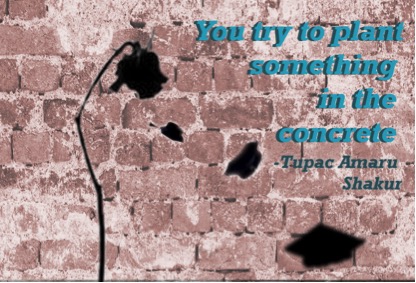“We are the roses‒this is the concrete‒and these are my damaged petals. Don’t ask me why, ask me how” -Tupac Amaru Shakur
In elementary school our teachers repeatedly highlighted the importance of hard work. They reminded us that despite everything that was out of our control, hard work was the key to earning the opportunity of a life changing education. That’s exactly what we did; we went to class, paid attention during every lesson, and turned in (most) of our homework. Our families didn’t always have the resources to help us along the way, but we managed to push each other. My friend, you were just as intelligent, if not more, than I was. All we wanted to do was make them proud‒our parents, teachers, everyone.
Seven years later, our day finally arrived. As I waited in line to cross the stage during my high school graduation ceremony, I stopped to take everything in. I glanced over the sea of graduates, excitement and joy painted across every single face, some of us were the first in our families to graduate from high school; the first to go on college; and the first to have a choice in our careers. Despite all the barriers, we made it. We beat the odds. I smiled, but then I noticed the empty chairs in the back rows.
You didn’t make it, and I did.
Growing up, I remember being on school lockdown for gun-related incidents more than I will ever remember practicing earthquake drills. My dear friend, the violence of South Central claimed you as their own. You never had the opportunity to open a college acceptance letter, your parents never had the chance to make an obnoxiously huge graduation sign, and we never step foot on predominantly white institutions to show them what the students from hood can really do in academia. We knew our brownness came with a price, but I never imagined it would be this.
What happens when a child from an inner city community becomes a victim of institutional oppression? What happens when a child from South Central get caught in the middle of a gang fight? The media blames the environment, our upbringing, and my favorite excuse, the culture of poverty. A child shot in an affluent community, and rallies for gun control emerge like wildfire. The death of a child is always a tragedy, but the death of black and brown students can no longer continually be dismissed. Our elementary school has a 17% math proficiency rate. This is where the education pipeline starts. Our community almost exclusively had access to dropout factories from the very beginning of our education careers. Over 800 of our peers entered middle school already grade levels behind, into another failing middle school. So 800 eleven year-olds can either play the catch up game and learn years of material or conclude that they aren’t smart and school isn’t for them. My peers who fell behind carried the idea that they were bad students. Many of them abandoned their dream careers for realistic employment avenues. Often times a realistic employment opportunity was selling drugs, job and life security was joining gangs.
No, mortality rates in the hood aren’t high because of our culture, but rather because of lack of pathways out of poverty. Instead of helping children who struggle in school, the school to prison pipeline practices push students out of the classroom and into the streets. Generations of the gang cycle remain in inner cities as children become the casualties of an institutional practice. Both students‒the ones pushed out of school and the victims of violence‒are the casualties of the school to prison pipeline.
Today when I sit college lecture halls of my college classes, still I focus on the empty seats. The empty seats in higher education that you and so many other students never had the chance to fill.
Right now, another child’s life is at stake. What will you do to demand a change?
Desiree Martinez
Latest posts by Desiree Martinez (see all)
- Broken Student Loan System Gets An Overhaul - June 6, 2022
- Cellblock Scholars: The First College Behind Bars - May 25, 2022
- Sin Preparación en la Universidad; Puntajes bajos debido a la Pandemia - April 27, 2022
- Unprepared in College; Sinking Scores Due to Pandemic - April 21, 2022
- Los Estudiantes No Se Inscriben en la Escuela Para Hacer una Declaración Política, Ellos Van a Aprender - October 29, 2018

